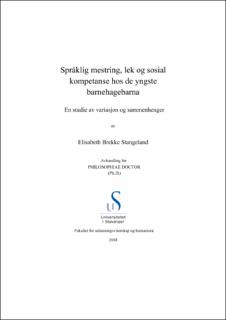| dc.contributor.advisor | Wagner, Åse Kari Hansen | |
| dc.contributor.advisor | Lundetræ, Kjersti | |
| dc.contributor.advisor | Reikerås, Elin | |
| dc.contributor.author | Stangeland, Elisabeth Brekke | |
| dc.date.accessioned | 2020-11-30T14:47:59Z | |
| dc.date.available | 2020-11-30T14:47:59Z | |
| dc.date.issued | 2018-04 | |
| dc.identifier.citation | Språklig mestring, lek og sosial kompetanse hos de yngste barnehagebarna : En studie av variasjon og sammenhenger by Elisabeth Brekke Stangeland, Stavanger : University of Stavanger, 2018 (PhD thesis UiS, no. 389) | en_US |
| dc.identifier.isbn | 978-82-7644-765-1 | |
| dc.identifier.issn | 1890-1387 | |
| dc.identifier.uri | https://hdl.handle.net/11250/2690326 | |
| dc.description | PhD thesis in Reading research | en_US |
| dc.description.abstract | Three studies were conducted that examined variation in and the relationship between language proficiency, play and social competence at the age of 33 months within the context of Norwegian barnehages (early childhood education and care institutions — ECEC). In Study 1, the main aim was to gain knowledge on gender differences in the language and participation in language activities (PLA) of toddlers at 33 months old when observed in naturalistic settings by staff at the ECEC. Also, we wanted to explore the association between PLA and language skills and gender within the ECEC context. The results showed that there are gender differences in toddlers’ language when reported by ECEC staff, and that boys participate somewhat less than girls in PLA. The results also showed that PLA was significantly related to language proficiency at 33 months.
In Study 2, the main aim was to explore differences between multi- and monolingual children’s language skills and social functioning, as well as the relationship between Norwegian language skills and social functioning in multilingual children. The results show distinct relationships between language skills and social functioning at 33 months, and that multilingual children have poorer Norwegian language skills and social functioning than monolingual children at 33 months.
Study 3 had two aims: (1) to investigate whether there is a relationship between social functioning and language proficiency at an early age; and (2) to identify the unique contributions made by both language skills and social competence to toddlers’ functioning during play. Toddlers with very low language skill scores were compared with toddlers with very high scores. It was found that there is a relationship between toddlers’ functioning during play and their language proficiency, but that toddlers’ functioning during play is better explained by their social competence than by their language skills. The present Phd. project contributes to the knowledge in this field in the following ways: Firstly, using observations undertaken by ECEC staff indicates significant variation in childrens’ participation in play (study 3) and language activities within the ECEC context (study 2). Secondly, language proficiency is found to predict social functioning in both multi- and monolingual toddlers (study 2), and toddlers with low, average and high language scores. And finally, the association between language proficiency and play is suggested to be mediated by social competence at the age of 33 months. | en_US |
| dc.publisher | University of Stavanger, Norway | en_US |
| dc.relation.ispartofseries | PhD thesis UiS; | |
| dc.relation.ispartofseries | ;389 | |
| dc.relation.haspart | Artikkel 1: Stangeland, E. B; Lundetræ, K.; Reikerås, E. (Akseptert) Gender Differences in Toddlers’ language and participation in language activities in Norwegian kindergartens. European Early Childhood Education Research Journal. | en_US |
| dc.relation.haspart | Stangeland, E. B.; Wagner, Å. K. & Reikerås, E. (2014) Flerspråklige og enspråklige barns språklig og sosial fungering i barnehagen. I: Skaftun, A. Uppstad, P. H. og Aasen, A. J. (red.). Skriv! Les! 2, Artikler fra den andre nordiske konferansen om skriving, lesing og literacy. Bergen: Fagbokforlaget (s. 65–90). | en_US |
| dc.relation.haspart | Stangeland, E. B. (2017) Impact of language skills and social competence on play behaviour in toddlers. European Early Childhood Education Research Journal, 25(1). Denne artikkelen er ikke i Brage pga. opphavsrett. | en_US |
| dc.rights | Copyright the author, all right reserved | |
| dc.rights | Navngivelse 4.0 Internasjonal | * |
| dc.rights.uri | http://creativecommons.org/licenses/by/4.0/deed.no | * |
| dc.subject | lesevitenskap | en_US |
| dc.subject | tospråklighet | en_US |
| dc.subject | flerspråklighet | en_US |
| dc.subject | barnehagebarn | en_US |
| dc.subject | språkmestring | en_US |
| dc.title | Språklig mestring, lek og sosial kompetanse hos de yngste barnehagebarna : En studie av variasjon og sammenhenger | en_US |
| dc.type | Doctoral thesis | en_US |
| dc.rights.holder | ©2018 Elisabeth Brekke Stangeland | en_US |
| dc.subject.nsi | VDP::Social science: 200::Education: 280::Subject didactics: 283 | en_US |

